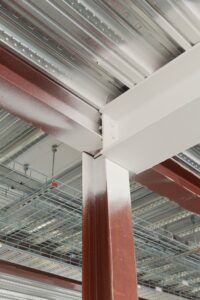What is Passive Fire Protection
Passive Fire Protection (PFP) stands as a silent sentinel in the architecture of safety for businesses. Unlike active fire protection systems, such as sprinklers and alarms that actively extinguish or alert individuals to a fire, passive fire protection is built into the structure of a building, working quietly but effectively to contain fires and prevent the spread of smoke and flames. This integrated approach to fire safety is crucial in saving lives, preserving property, and ensuring the continuity of business operations.

One of the key components of passive fire protection is the use of fire-resistant walls, floors, and doors that compartmentalize a fire, keeping it contained to a single area. This compartmentalization strategy is vital because it gives occupants more time to evacuate and allows for a more controlled and efficient firefighting response. In scenarios where businesses house sensitive or valuable materials, such compartmentalization can mean the difference between a minor incident and a catastrophic loss.
Moreover, the materials used in passive fire protection—such as fire-resistant glass, intumescent paint, and firestop systems—are specifically designed to withstand high temperatures. They play a critical role in maintaining the structural integrity of a building during a fire, which can prevent the devastating collapses that might otherwise occur under the stress of extreme heat.
For business owners, investing in passive fire protection is not only about adhering to legal safety regulations but also about ensuring a resilient operational framework. In the wake of a fire, businesses equipped with effective PFP can often resume operations faster than those without, reducing downtime and financial fallout.
Furthermore, the presence of robust passive fire protection systems can reflect positively on a business’s reputation. It signals a commitment to the safety and well-being of employees and clients alike, fostering a sense of trust and reliability. In this way, passive fire protection does more than just safeguard against the immediate dangers of fire—it builds a foundation of confidence and continuity that underpins the very essence of a successful business.

Why Zillion Passive Services?
There are many reasons for your business to trust Zillion Passive Services. Our years of hands-on experience in the industry has enabled us to create a work culture which truly values clients’ resources and provides complete value for their money.
- Experienced Team Zillion Passive Services boasts a team of highly skilled professionals and associates with extensive experience in fire protection.
- Compliance Assurance We ensure that all services comply with relevant fire safety regulations and standards, providing clients with peace of mind and legal compliance.
- Customized Solutions Zillion Passive Services understands that each business has unique fire safety requirements, and offers tailored solutions to address specific needs and challenges.
- Proactive Maintenance Zillion Passive Services emphasizes proactive maintenance and regular inspections to detect and address potential issues before they escalate into emergencies


Why is Passive Fire Protection important?
Passive fire protection is essential for safeguarding both lives and property in commercial buildings, ensuring compliance with regulations, reducing financial risks, and maintaining business continuity.
The primary reason for implementing passive fire protection measures is to protect the lives of the building occupants. It helps contain fires within a limited area, preventing or delaying their spread throughout the building. By containing fires to the area of origin, passive fire protection also helps in minimizing property damage This can significantly reduce the financial losses associated with fire incidents, including damage to buildings, equipment, inventory, and other assets.
Fire incidents can disrupt business operations, leading to downtime, loss of revenue, and damage to the reputation of the business. Passive fire protection measures can help mitigate these risks by minimizing the impact of fires and allowing for faster recovery and continuity of business operations.
Many building codes and regulations mandate the implementation of passive fire protection measures to ensure the safety of occupants and protect property. Compliance with these codes is essential for obtaining permits, insurance coverage, and maintaining a safe working environment.

Important Information
FREQUENTLY ASKED QUESTIONS
Why is fire protection crucial for commercial buildings?
Fire protection is vital for safeguarding lives, minimizing property damage, ensuring business continuity, and maintaining compliance with safety regulations. It helps manage risks associated with fire, which can be catastrophic in densely populated or high-value property areas.
What are the components of a good fire protection system?
A comprehensive fire protection system includes fire detection systems (like smoke alarms), fire suppression systems (such as sprinklers and fire extinguishers), proper signage (exit signs and evacuation maps), and regular maintenance and inspection protocols to ensure everything functions correctly.
WHAT THEY ARE SAYING
ABOUT COMPANY
Zillion Services was outstanding in upgrading our fire safety protocols. Their attention to detail and expert guidance were invaluable. We feel much safer thanks to their professionalism.
Robert Dickson - Director
Statewide fire Pty Ltd






